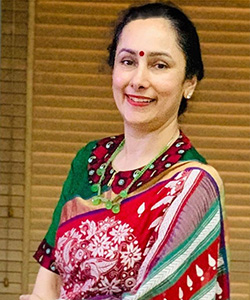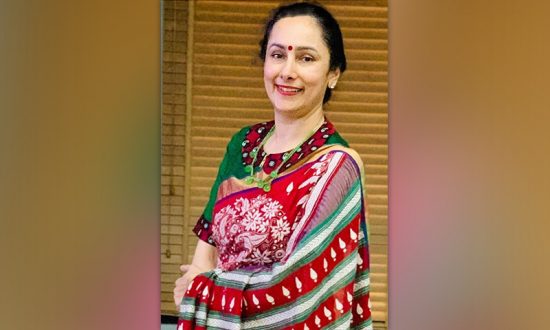Having an experience of about 15 years, Dr Neelima Kamrah of KIIT World School is the Principal of KIIT World School. She has worked as Vice Principal in KIIT World School, Delhi and Registrar at KIIT Group of Colleges, Gurgaon. Dr Neelima has published about 8 papers in various journals. Her primary areas of interest are Multiple Intelligence, Teaching-Learning Process, and writing research papers. Dr Neelima is a life- long learner.
The National Education Policy’s plan to introduce teaching and learning in the mother tongue is an incredibly bold move. The prelude of the mother tongue will encourage a child to go to school with enthusiasm. The mother tongue is not just a language, but a sense of belonging and valuing it can aid in fostering respect for one’s heritage. The NEP’s move will definitely help to bring back the emphasis and importance of our Indian languages and perhaps, also help to de-emphasize the importance of English. Being bilingual will also open up social and cultural opportunities for students and help one develop new perspectives.
NEP 2020 is exactly on the lines of Basic Education by Mahatma Gandhi. Gandhi Ji said that “school must be an extension of the home. There must be concordance between the impressions which a child gathers at home and at school if the best results are to be obtained. Like we cannot properly play a veena without a plectrum or a drum without its sticks. Similarly, mother tongue is essential for a deeper understanding of concepts. We can only achieve a natural flow of thoughts through our mother tongue”.
Gandhi Ji said “I must cling to my mother tongue as to my mother’s breast, despite its shortcomings. It alone can give me the life-giving milk” (Harijan, 1946). Language holds the key to understanding, and without it, any concept taught is meaningless. One can master a concept only if one has a stronghold on the language it is presented in, and there is no language more conductive than one’s mother tongue for learning. It has been proven time and again through research that students who study in their mother tongue find it easier to learn the information presented, retain it for longer periods and find it easier to understand the concepts and relate them to real life. Quantitatively, studies also show that children who receive schooling in their mother- tongue language in early grades have better learning outcomes overall and have significantly better literacy levels. Apart from academic benefits, learning in mother tongue has proven to improve speaking skills and social skills, which are key factors in creating well-rounded citizens.
The proposed system provides a very promising prospect for our future education system and can revolutionize the teaching-learning process. However, there are few creases in the proposed plan which can be ironed out by making certain changes in the system. If with careful planning this system is implemented successfully, I am certain it can make a positive impact on our current education system.
Strengthen Foundation for Learning
Home is the first school for any kid, and children should be taught in their mother tongue. Beginning with mother tongue at home and learning in a foreign language in school slows down the learning process. Any foreign language can be easily learnt by a child even after grade 5 because of brain plasticity. When the language of instruction is in the mother tongue, children can understand concepts faster and retain them for longer.
Engaging in Classroom Conversation
The use of mother tongue as a medium of instruction in the classroom helps students to understand easily and connect with the classroom conversation. Learning in a foreign language may lead to distraction among students. Due to the use of the English language, many parents are not able to participate in their child’s schooling. This will increase the rate of parental participation in a child’s schooling and will lead to strong home-school partnerships.
Increasing Mental Skills
Being bilingual enhances analytical skills, they have higher synaptic activity in the brain due to multiple languages which shows higher mental flexibility and processing power. Learning in the local language will boost self-confidence and will be able to express themselves in better ways.
Maintaining Cultural Heritage
India has different and beautiful languages which are unique in itself. The loss of our languages and dialects will be a cultural loss not just to India but also to the world. Learning through mother language or local language helps children to connect with their ancestors in a way which others can’t. Developed countries offer education in their native language which helps in preserving and maintaining cultural heritage.
Despite its various advantages, there are a few shortcomings to this approach. Firstly, this concept is hard to implement in metro cities where the students from multilingual backgrounds attend the same school; hence, it is hard to enforce a language as the primary mode of teaching. Another downfall of this approach is that it does not take children who need to transfer from one city to another in mind. The children who transfer schools could face challenges adapting to a new language in their new schools.
More about Dr Neelima Kamrah

As an academician, Dr Neelima Vardhan has received several accolades, including UCH Vibgyor Award (2016), Sewa Excellence Award (2016), Harish Chandra Swantra Saini Acharya Award, Himotkarsh Rashtriya Ekatmakta Mahila Sashastrikarn Puraskar (2016), Stevie Award for women in Business (2014), Harijan Sewak Sangh, Delhi with Shri Laxmi Das Ji for the downtrodden strata of the society, Dr Nirmala Deshpande Award, Human Right Council Award for Women Empowerment, Dr Rajendra Prasad Award (2005), and Delhi State Teachers Award (2007). She has been fortunate to be associated with Gandhian Institutions like Delhi Gandhi Smarak Nidhi, Harijan Sevak Sangh, Kingsway Camp Delhi, Vishwa Nagari Vigyan Sansthan, Akhila Bhartiya Rachnatmak Samaj, Akhila Bharatiya Prakritik Chikitsa Parishad, Boodan Yagna Board, Hyderabad, and Gandhi Smriti Darshan Smriti, New Delhi.




